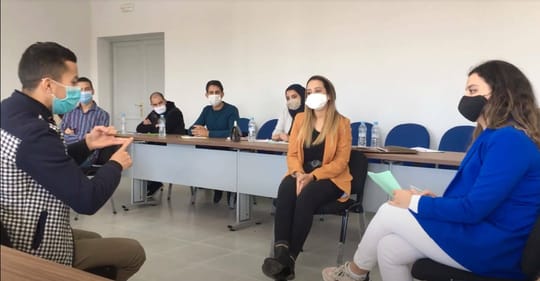Family Mediation & Reconciliation in Morocco | USMBA Legal Aid Clinic, Fes

On November 7, 2020 the Legal Clinic housed at University Sidi Mohamed Ben Abdellah’s Faculty of Economic and Social Legal Sciences in Fes (FSJES-USMBA) held trainings on family law in Morocco, specifically mediation and reconciliation. These are two of several thematic trainings designed to strengthen the capacity of students who are preparing to become student clinicians.
Professor Moutaki, a specialist in family law, facilitated the session designed to give students practical information on family mediation. Indeed, training relating to this topic is of crucial interest to clinicians insofar as they will be responsible for playing the role of family mediator, in order to avoid any recourse to court. Due to their academic training as lawyers, the clinicians were able to understand and follow the training with the professor by asking him relevant questions relating to special and practical cases. Some students already had a background in family law, which made this training particularly pertinent.
In addition to allowing students the time to discuss important questions related to family mediation, Professor Moutaki also focused on building their capacity in terms of soft skills related to family reconciliation. Mr. Moutaki discussed his experience related to the determination of the legal domain of family mediation, as well as their main characteristics and the cases in which mediation cannot be applied.
Students were then encouraged to apply what they had learned in the form of an interactive skit supervised by Professor Moutaki with the aim of better understanding the concept of mediation by clinicians. A student shared that Professor Moutaki’s roleplay exercise “solidified the theoretical information.”
Lack of access to legal aid
During the previous week, on October 31, 2020, Professor Amir el Mazarah facilitated a session on family reconciliation. Professor el Mazarah began with a word on the importance of family in society. He emphasized the importance of protecting it by effective means, hence the need for a technique for dealing with conflicts within the family. Professor el Mazarah specified the legal nature of this technique, its main characteristics, and the situations in which family conciliation cannot be applied.
Family mediation and reconciliation is particularly important in Morocco. Financial restrictions are a primary reason why people don’t seek legal advice, and this constraint is exacerbated for people facing family disputes. Furthermore, emerging data shows that all types of violence (particularly violence that occurs at home) against women and girls has intensified since the outbreak of COVID-19. This indicates a need for legal counsel, and a decrease in access due to public health restrictions. The clinic offers virtual counsel to increase access to those who may not be able to leave their home — whether it be for health or safety reasons.
These sessions were one of several trainings organized by the High Atlas Foundation that is designed to prepare students to become practitioners of pro bono legal aid to people in vulnerable situations in the Fes-Meknes region. Students have also received training on topics including but not limited to migration, asylum, and participatory communication.
Learn more about how you can support the efforts of the Legal Aid Clinic here.
The High Atlas Foundation is working in partnership with the Faculty of Economic and Social Legal Sciences at the University Sidi Mohamed Ben Abdellah (USMBA) in Fes to operate and grow a Law Clinic and Legal Aid program which actively engages students in experiential and service learning for the benefit of marginalized communities in the Fes-Meknes region. The project is funded by the National Endowment for Democracy (NED) and the U.S.-Middle East Partnership Initiative (MEPI).